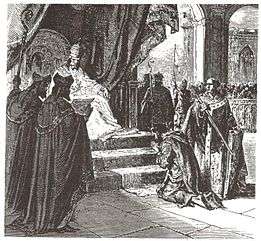822
| Millennium: | 1st millennium |
|---|---|
| Centuries: | 8th century · 9th century · 10th century |
| Decades: | 790s · 800s · 810s · 820s · 830s · 840s · 850s |
| Years: | 819 · 820 · 821 · 822 · 823 · 824 · 825 |
| 822 by topic | |
| Politics | |
| State leaders – Sovereign states | |
| Birth and death categories | |
| Births – Deaths | |
| Establishment and disestablishment categories | |
| Establishments – Disestablishments | |
| Gregorian calendar | 822 DCCCXXII |
| Ab urbe condita | 1575 |
| Armenian calendar | 271 ԹՎ ՄՀԱ |
| Assyrian calendar | 5572 |
| Bengali calendar | 229 |
| Berber calendar | 1772 |
| Buddhist calendar | 1366 |
| Burmese calendar | 184 |
| Byzantine calendar | 6330–6331 |
| Chinese calendar | 辛丑年 (Metal Ox) 3518 or 3458 — to — 壬寅年 (Water Tiger) 3519 or 3459 |
| Coptic calendar | 538–539 |
| Discordian calendar | 1988 |
| Ethiopian calendar | 814–815 |
| Hebrew calendar | 4582–4583 |
| Hindu calendars | |
| - Vikram Samvat | 878–879 |
| - Shaka Samvat | 743–744 |
| - Kali Yuga | 3922–3923 |
| Holocene calendar | 10822 |
| Iranian calendar | 200–201 |
| Islamic calendar | 206–207 |
| Japanese calendar | Kōnin 13 (弘仁13年) |
| Javanese calendar | 718–719 |
| Julian calendar | 822 DCCCXXII |
| Korean calendar | 3155 |
| Minguo calendar | 1090 before ROC 民前1090年 |
| Nanakshahi calendar | −646 |
| Seleucid era | 1133/1134 AG |
| Thai solar calendar | 1364–1365 |
| Wikimedia Commons has media related to 822. |
Year 822 (DCCCXXII) was a common year starting on Wednesday (link will display the full calendar) of the Julian calendar.
Events
By place
Byzantine Empire
- Thomas the Slav, Byzantine general (tourmarchos) and usurper, continues his revolt against emperor Michael II. He unsuccessfully besieged Constantinople, while his fleet is destroyed by Michael's Byzantine navy using Greek fire. Khan Omurtag of Bulgaria sends an relief army and defeats the rebels at the Battle of Kedoutos (near Heraclea).[1]
Europe
- Emperor Louis I performs public penance for causing Bernard's death, at his palace of Attigny (Ardennes), before pope Paschal I, and the Frankish nobles. This to restore harmony and re-establish his authority.[2]
Britain
- King Ceolwulf I of Mercia invades Powys (Wales), but is beaten back by king Cyngen. He destroyes the fortress of Deganwy and takes the kingdom later under his control (approximate date).
Al-Andalus
- Al-Hakam I, Umayyad emir of Córdoba, dies after a 26-year reign. He is succeeded by his son Abd al-Rahman II, who begins a military campaign against king Alfonso II of Asturias in Al-Andalus (modern Spain).
Asia
- Kim Heon-chang launches a short-lived rebellion in Silla, which gains control over much of the southern and western Korean Peninsula.
Americas
- February 6 – Ukit Took becomes the last ruler (ajaw) of the Mayan city-state Copán (modern Guatemala).
By topic
Religion
- Rabanus Maurus, a Frankish Benedictine monk, becomes abbot of Fulda after the death of Eigil.
Births
- Al-Mutawakkil, Muslim caliph (d. 861)
- Minamoto no Tōru, Japanese poet (d. 895)
- Xuefeng Yicun, Chinese Chan master (d. 908)
Deaths
- June 26 – Saichō, Japanese Buddhist monk (b. 767)
- Al-Hakam I, Muslim emir of Córdoba (b. 771)
- Al-Waqidi, Muslim historian and biographer
- Denebeorht, bishop of Worcester
- Eigil of Fulda, Bavarian abbot
- Gregory Pterotos, Byzantine general (strategos)
- Kim Heon-chang, Silla aristocrat and rebel leader
- Li Yijian, chancellor of the Tang Dynasty (b. 756)
- Tahir ibn Husayn, founder of the Tahirid Dynasty
- Tian Bu, general of the Tang Dynasty (b. 785)
- Winiges, duke of Spoleto (Italy)
References
- ↑ Bury 1912, pp. 101–102; Lemerie 1965, pp. 279–281, 291; Treadgold 1988, p. 240.
- ↑ McKitterick, Rosamond, The New Cambridge History, 700-900.
This article is issued from Wikipedia - version of the 11/19/2016. The text is available under the Creative Commons Attribution/Share Alike but additional terms may apply for the media files.
